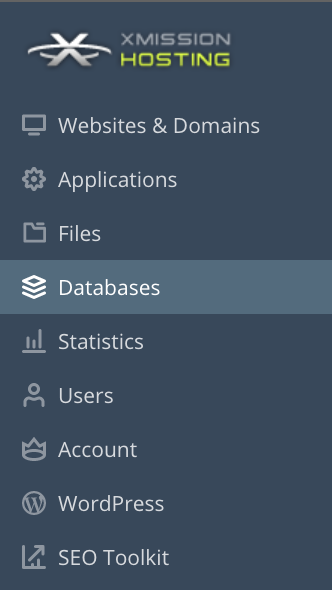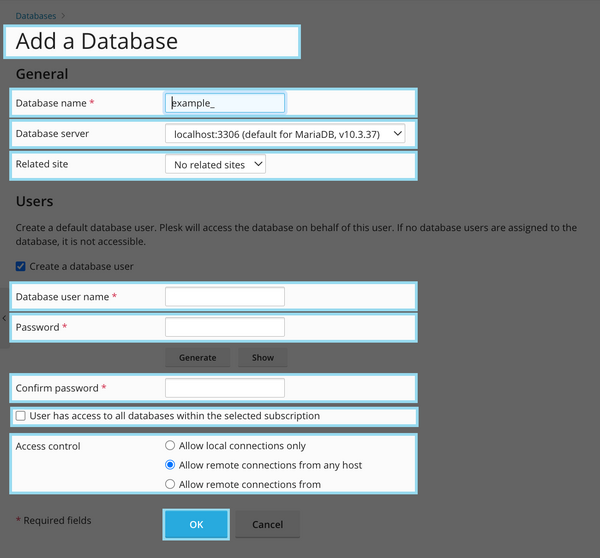Adding MySQL Databases: Difference between revisions
Jump to navigation
Jump to search
No edit summary |
|||
| (13 intermediate revisions by 4 users not shown) | |||
| Line 1: | Line 1: | ||
= Plesk Shared Hosting: Adding MySQL Databases = | |||
This management interface will allow you to not only create and remove databases, but also manage them with the integrated PHPMyAdmin web interface. | |||
*From the | *From the Side Panel, click on the "Databases". | ||
[[File: | [[File:PleskSidebar.png]] | ||
* | *On the next screen, you will see the option to "Add New Database" and, if you already have existing databases, you will see them listed near the bottom. To add a new database, simply click the button labeled "Add New Database." | ||
[[File: | [[File:PleskMySQL-1.png|600px]] | ||
*Now, you should see the screen below. The '''only''' field you can make changes to -- and it is necessary to do so -- is a unique name for your database. | |||
[[File:PleskMySQL-2.png|600px]] | |||
* '''Database name''' - the name of your database | |||
* '''Database server''' - you can choose MariaDB or PostgresSql if available | |||
* '''Related site''' - the domain which you want to associate the database with | |||
* '''Database use name''' - the username you want to use for your database | |||
* '''Password''' - the password for your database | |||
* '''Confirm password''' - retype your password | |||
* '''User has access to all databases''' - if you want this user to have access to all databases on your account you can check this box. | |||
'''Note''': We do not allow remote access to databases on shared hosting. If your development requires remote database access it can be manually reviewed after speaking with support. | |||
[[ | |||
To manage your existing databases, please read [[Managing MySQL]]. | |||
{{:Shared_Hosting}} | |||
[[ | [[Category:Shared Hosting|MySQL Databases]] | ||
Latest revision as of 23:11, 7 December 2022
This management interface will allow you to not only create and remove databases, but also manage them with the integrated PHPMyAdmin web interface.
- From the Side Panel, click on the "Databases".
- On the next screen, you will see the option to "Add New Database" and, if you already have existing databases, you will see them listed near the bottom. To add a new database, simply click the button labeled "Add New Database."
- Now, you should see the screen below. The only field you can make changes to -- and it is necessary to do so -- is a unique name for your database.
- Database name - the name of your database
- Database server - you can choose MariaDB or PostgresSql if available
- Related site - the domain which you want to associate the database with
- Database use name - the username you want to use for your database
- Password - the password for your database
- Confirm password - retype your password
- User has access to all databases - if you want this user to have access to all databases on your account you can check this box.
Note: We do not allow remote access to databases on shared hosting. If your development requires remote database access it can be manually reviewed after speaking with support.
To manage your existing databases, please read Managing MySQL.
- Administration/Logging in
- Adding a Domain
- Adding MySQL Databases
- Adding/Managing DNS Records
- Managing Domain/Users
- Managing FTP Access/Users
- PHP Settings
- Previewing the Website
- Secure Your Sites
- Web Statistics
Additional Development Help
Applications
Domain Management


